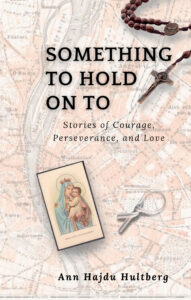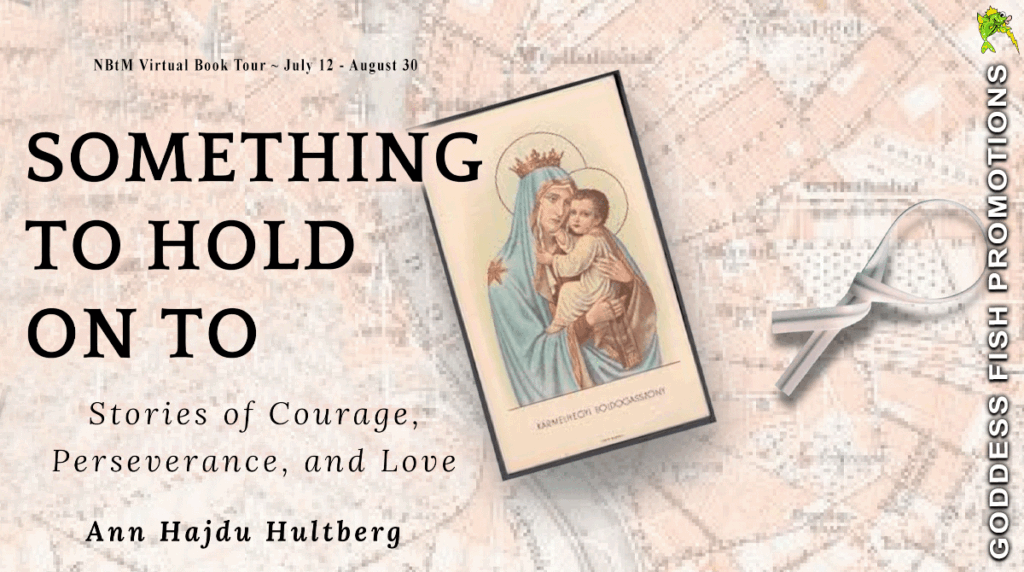Today’s special guest is writer Ann Hajdu Hultberg. We’re chatting about her anthology memoir, Something To Hold On To: Stories of Courage, Perseverance, and Love.

During her virtual book tour, Ann will be giving away a $15 Amazon or Barnes and Noble (winner’s choice) gift card to lucky randomly drawn winner. To be entered for a chance to win, use the form below. To increase your chances of winning, feel free to visit her other tour stops and enter there, too!
Bio:
I am a retired high school English teacher and adjunct college composition instructor. Many of my writing pieces have been published in online literary magazines and journals. My husband and I split our time between Pennsylvania and Florida. I am a simple person who enjoys Mother Nature, a glass of wine, a bag of popcorn, and Netflix.
Welcome Ann. Please tell us about your current release.
In life we hold on to our faith, family, friends, our sense of humor, our memories, and our promises. As a child, it might be a make- believe world. Sometimes it’s something physical like a prayer card or a twist tie, a school bag or a rosary bead. Maybe it’s a photo. Everything we hold dear brings us hope and comfort.
In each story, I write about what I and others have held on to, through my perceptions and reflections, all rooted in my experiences as a late Baby Boomer raised in rural Pennsylvania, but most importantly, by a Hungarian father, an immigrant, who escaped the Soviet Invasion in 1956.
What inspired you to write this book?
Initially I had no intention of writing a book. My goal was to write stories and submit them to literary magazines. I did not know if there would be any interest in what I had to say. After so many stories were published, my friends encouraged me to publish my collection into a book. I never looked into finding an editor or publishing company. I decided to self-publish.
Excerpt from Something To Hold On To:
from “Mom’s Girdle”
Mom was always losing or fighting with her 18-hour Playtex girdle. It seemed as if this contraption had a mind of its own, wanting to be seen, calling attention to itself, almost like a neon light flashing from a bar window. The trampoline like material sucked in all the fat so clothes appeared smooth and seamless without the ripples of excess pounds. From waist to upper knee, this apparatus was popular with my mom in the 60s and 70s. Her belly was flattened and thighs were made to look slimmer, something she said she needed after birthing four kids. These ghost white undergarments were a staple in mom’s underwear drawer.
The first time Mom lost a hold of her girdle was when she was out shopping, and the elastic, which had been shriveling on the waist band, probably from its years of wear, let loose. Like a broken rubber band snapping off a pony tail, the entire garment fell to her knees. Though in public, with many eyes upon her, mom simply shimmied the girdle down to her ankles, like a girl slinking down a fashion show runway; she peeled it off her ankles, and with a kick, tossed the girdle in the air like a spinning pizza crust. She grabbed at it and stuffed the undergarment in her purse as carefree as she would a wad of Kleenex. She continued on with her shopping.
from “Ashes to Ashes”
The first time I held her, I rubbed her small, wet nose and new soft fur as black as my onyx ring against my cheek, puffed out into a smile. We named her Ashes for her glossy, black coat, the color of the ashes in our wood-stove. Under the outdoor sun in 67- degree weather, I whispered sing-songy, hello, welcome to the family, we will love you forever. She was the newest member of the family, a Shih Tzu and poodle combination, her face more that of a poodle’s.
The last time I held her, nineteen years later, under a spiritless, sooty sky, with sultry temperatures, I rubbed her small, dry nose and bristly fur, now a mountain pine gray, against my wet cheek. I choked goodbye, we will miss you, we loved you forever.
The day Ashes died, she left her brown shag fur bed, and wobbled onto the living room tile floor where she collapsed; we think she had a stroke. She had been failing for several weeks. She was losing bladder control, so we fitted her with pink, disposable doggie diapers. She quit eating and drinking no matter how much I coaxed her. I boiled chicken and rice, once her favorite, but she didn’t even sniff at her bowl. I could not bring myself to accept that the end was near. So she showed me the way. That it was time.
from “Something To Hold On To”
A mother smothered her child to save fifty adults. She held a wool blanket tight over her infant’s face to stop her cries because their group could not be given away, could not be found in hiding. They all would have been shot or sent to prison camp. The pressure to stop the baby’s sounds stopped her breath.
My father was one of the last of the 200,000 Hungarian refugees who fled the country, traveling by train, truck, or foot, to escape Hungary’s Soviet-imposed policies.
Small in stature, but immense in resourcefulness and survival, dad beat all odds. As a young man he was captured by the Russians and placed in a group to be sent by boxcar to Russia. The people were told to stay in line, or they would be shot. He escaped by pretending to be a doctor to tend to a woman who had fainted. When the guard left to get water for the woman, he made his move and ran to a nearby building. Here a man hid him in his house until the Russians gave up their search.
He was later captured a second time by the Hungarian Gestapo, again to escape by using his wits. He found a Hungarian doctor to falsify a report that he had contagious T.B. and he was released. But others were not so lucky. Raping, killing, stealing– these atrocious crimes were all part of the Russian occupation. The young, the old, the sick were captured off the street and sent to Russia to work, or to fight for their army, but most died before reaching their destination.
What exciting project are you working on next?
I am working on a memoir in pieces. I am writing about my dad’s life in Budapest during the Siege on Budapest during WWII and a more detailed story about his escape from Hungary during the Uprising of 1956. I am also including other survival stories. This time I am going to try for traditional publishing.
When did you first consider yourself a writer?
Four years ago when I had a piece published by Drunk Monkeys. That acceptance gave me the confidence to keep writing and submitting stories.

Do you write full-time? If so, what’s your workday like? If not, what do you do other than write and how do you find time to write?
I am retired, so I can set my own writing schedule. I do prefer to write in the morning and then later at night after dinner.
What would you say is your interesting writing quirk?
I don’t always compose on the computer. Sometimes I write in my journal. When I do, I prefer a certain pen, a Pilot Precise, in black, fine point. Also, I prefer a Peter Pauper Press Haiku Journal. White cherry blossoms adorn the cover. There is a white ribbon bookmark, and the page edges are dipped in gold. It’s gorgeous!
As a child, what did you want to be when you grew up?
First, I wanted to be a ballerina and dance for the queen of England. Then I wanted to design amusement park rides. After I broke my foot, I wanted to be a nurse. A few years later, I knew that I wanted to do something with books and writing.
Anything additional you want to share with the readers?
I believe that Baby Boomers and early Generation X readers will connect to these stories. Anyone who grew up in rural America will appreciate the simpleness of life as described in these stories. Readers who have experienced immigration or know of someone who has will relate to my stories about my father’s escape from Hungary during the 1956 Uprising.
My hope is that you will both laugh and cry at these poignant moments we experience in life.
Links:
Twitter | Facebook | Instagram | Amazon | Bookbaby

